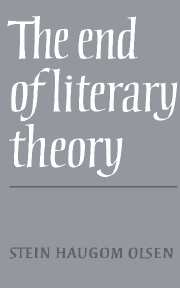Book contents
- Frontmatter
- Contents
- Preface
- Literary aesthetics and literary practice
- Interpretation and intention
- Authorial intention
- Text and meaning
- The ‘meaning’ of a literary work
- Defining a literary work
- What is poetics?
- On unilluminating criticism
- Criticism and appreciation
- Value-judgements in criticism
- Literature, fiction, and reality. A problematic relationship
- Thematic concepts: where philosophy meets literature
- Literary theory and literary aesthetics
- Notes
- Bibliography
- Index
Literature, fiction, and reality. A problematic relationship
Published online by Cambridge University Press: 05 November 2011
- Frontmatter
- Contents
- Preface
- Literary aesthetics and literary practice
- Interpretation and intention
- Authorial intention
- Text and meaning
- The ‘meaning’ of a literary work
- Defining a literary work
- What is poetics?
- On unilluminating criticism
- Criticism and appreciation
- Value-judgements in criticism
- Literature, fiction, and reality. A problematic relationship
- Thematic concepts: where philosophy meets literature
- Literary theory and literary aesthetics
- Notes
- Bibliography
- Index
Summary
ONE
At the beginning of the 1950s H. L. A. Hart wrote an article, ‘A Logician's Fairytale’, in which he maintained that
The storyteller's use of sentences does not in fact satisfy the conventional requirement for normal use, but he speaks as if they did, and thus obtains his effects. … We might say ‘There are no ogres’ comfortingly to the crying child who has heard the storyteller say ‘Some ogres are wicked’, or we might say it admonishingly to the storyteller. And in either case we are doing something more radical than saying ‘That is false’ but less radical than saying ‘That has no sense’; we are saying ‘That applies to nothing’. We could contradict ‘Some ogres are wicked’ by saying ‘That is false: no ogres are wicked’, but contradiction is a colder comfort than what we provide with ‘There are no ogres’, for it leaves the child to face ogres with qualities other than wickedness. ‘There are no ogres’ cuts deeper at the roots of fear: it points out that the existential conditions for a serious statement which can be graded as either true or false are not on this occasion satisfied and so ‘Some ogres are wicked’ is neither.
In this passage Hart applies to storytelling the insight developed by Strawson in ‘On Referring’, that descriptive sentences, like ‘The King of France is Wise’, do not, as Russell said, logically entail an existential statement to the effect that the logical subject of the description exists.
- Type
- Chapter
- Information
- The End of Literary Theory , pp. 156 - 175Publisher: Cambridge University PressPrint publication year: 1987
- 1
- Cited by



